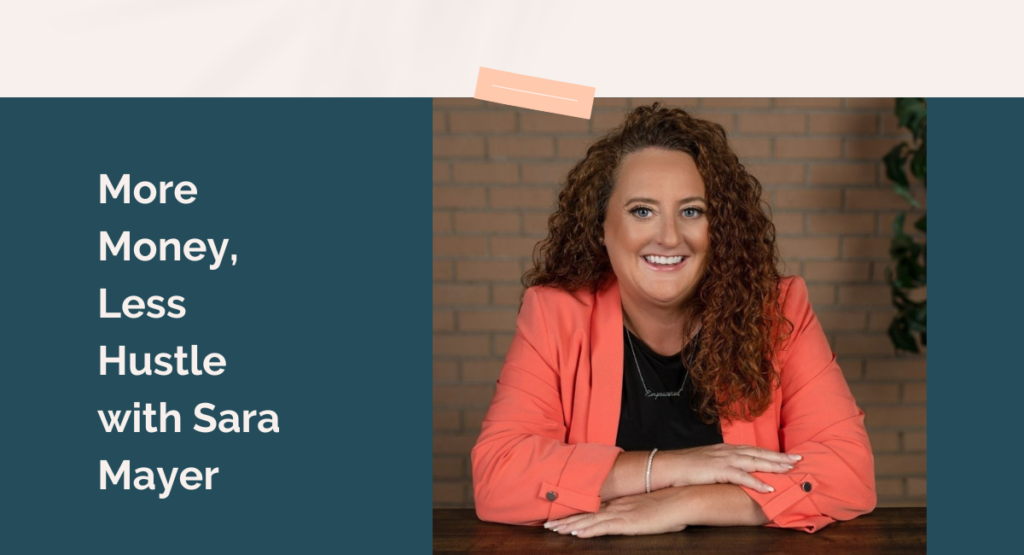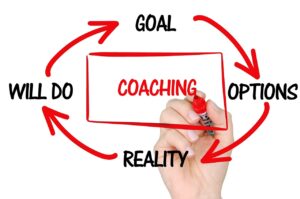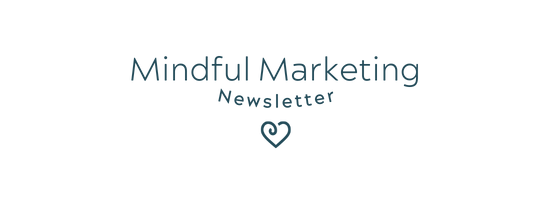Sara Mayer is owner and creator of Sara Mayer Consulting, and she’s your go-to productivity coach for organizing hectic days, weeks, and months into manageable and fractional chunks of work.
If you’re an entrepreneur, then I’m guessing that you need that, because all of us are doing one million things, especially if you are a multi-passionate, like I am. So Sara, I’m super excited to chat with you. I would love for you to introduce yourself a little bit more thoroughly than I just did, and then I’m going to ask you one million questions.
Follow us on…
Awesome. Well, Alison, thank you so much for having me. I always love chatting with everyone and helping people out so that they can accomplish more without working 24 hours a day. I’m an open book, so feel free to ask me any questions that you have. I’m always willing to answer them.
Table of Contents
ToggleHow Sara Got Started as a Productivity Coach
Awesome. Well, my first question, I always love to know, how and why did you get into business, and what were you doing before?
Yeah, I love this question. It’s really interesting, at least I think so. I was working in corporate America. I worked in several educational companies, large educational companies, as well as nonprofits, and I stumbled into my business.
My boss asked me to put together a training for people who were struggling in recruitment and sales. So, I wanted to go find out what the top performers were doing. I simply went and said, “Let me sit with you and watch you work.” I was shocked when I saw how unorganized and inefficient they were, and I started really thinking about the systems at the company that had built up over time.
What I’ve actually found is that while they were the top performers with the metrics that we had been given – they actually were overworking everybody, so they were working the equivalent of two employees.
Suggested: Need an online business coach? Read more here.
When we aggregated their time, they were just outworking people. They actually were not the top performers, if you only worked 40 hours.
There were people who were way more efficient and organized. So, I started that study of how people work, and that’s really where the hustle culture hit me right in the face. I asked the C-suite: in order to be successful here, do you have to work all the time? Their answer was no.
We set out on this productivity project to level set the culture, and we basically told people, “You can only work 40 hours.” That really launched the rest of my career and also my productivity coaching business. I started studying the workforce, how we manage employees and the work that they’re doing. People started asking me, “Can you help my husband? Can you help my wife? She has her own business and she’s working all the time.”
That’s the birth of Sara Mayer Consulting. I started just from that simple question of, “Can you put together a training?”
Oh gosh. You’re right. That is a very interesting story. I like that the company was on board, and I love that whole idea that you started from the place of, “Hey guys, you can’t work more than 40 hours a week anymore.”
I’m glad that the company supported that. There’s a lot of corporate cultures, or any traditional employment culture, where it’s praised to work more, come in earlier, come in on the weekend, cover someone.
Making the Switch to Self-Employment as a Productivity Coach
Two companies ago, before I finally went full time, I worked somewhere that really prided themselves on a flexible work schedule. But it’s only flexible to some degree, and still the people who were rewarded are the people who were working a lot. How did you go from doing that to going off on your own? How did you make that transition?
Great question.
One of the things that really spoke volumes in that example is that we doubled our revenue that year and we lowered our turnover. So the results were there, and so that’s really how it started for me, my business, because people were like, “You did this here, and that was such a bold move.”
I mean, we actually took a very hard stance. Their phones did not work.
You couldn’t even check your email after 40 hours. So they really were committed to that, and that’s where people started asking me, “Can you help my wife? She just started hiring people, and they’re working all the time, and how can you help them? How can you help her business and my company, or my husband’s company?”
I started to taking on productivity coaching clients as a side hustle. Just looking at their operations as a company, but also how their employees were actually getting the work done and then making recommendations. And then during 2020, during COVID, of course, made some shifts and really decided to go on my own. And I’ve been busy ever since, which is great.
Yeah. Oh, that’s awesome. And so it sounds like when you first went off on your own, the opportunity was really just coming to you. People heard about what you were doing. You were obviously getting amazing results. So you went into your business full-time what year?
2020. July of 2020.
Shifting to Intentional Marketing
Oh, wow. I went in January of 2020. So right before everything went crazy. And so how has the way that you’ve gotten productivity coaching clients changed from then to now? Because I’m guessing at some point you’ve had to do a little bit more of intentional marketing.
Yeah. So before, it was mostly referrals.
I hadn’t really decided who I wanted to work with, so it was just everybody. People would refer me to clean out other people’s email boxes or do little projects, which are fine and great, and I’m glad people were thinking of me, especially during that time.
So my message has really changed to helping people who want to maximize their time and their workforce in a strategic way: more strategy.
I’ve been marketing more towards businesses and entrepreneurs that are looking to do that; I’ve branched off into building funnels like a lot of people have done and running ads, and then also really doubling down on my current clients, asking them who else I can help. And that has really boosted things. So while I’m not directly connected to them, the referrals have still been coming in very strong.
Yeah. That’s awesome. And so at the company, you were able to double your income while everybody started working less. I’m guessing that the employees were also happy about that.
Helping Solopreneurs Work Less and Make More
I have so many questions. Maybe you can share a recent story of a client, like a solopreneur, especially, if you work with any, where you were able to help them increase their income while helping them to work less.
Yeah. One thing with sole entrepreneurs is many of them want to eventually hire.
There are many things that they’re going to need to do before they get to that point, before they can hire.
I think it’s really important to have a strategy behind that. As a sole entrepreneur, what do you really like working on? So I have a client where she really, really loves doing the actual work of her business. She does not like the sales or that component. And so what I did is take a look at her whole process, and we built her sales strategy and system so that eventually, when she does step away and hire somebody for that role, she has everything she needs to turn it over for that person to be successful.
And then I had another client who was very similar, but the opposite.
She’s a lawyer, and she loves getting new clients. But she does not like to the actual work when she gets the clients. And so we built a whole strategy for her.
It’s really about strategically determining where you’re going, even if you’re not there yet, and then putting those pieces into place. That way, when you do get there and you do hire somebody, they are able to pick it up. Your business doesn’t see a decline or a bump in the road when you bring somebody on. So many entrepreneurs bring somebody on to their business, and then it’s not successful. Or, they have a bad experience because they’re either bringing on the wrong person, or that person doesn’t have the tools to do what they need to do.
So that’s what I do. I work with entrepreneurs to really set up their systems before they’re ready to scale, and then once they are scaling and bringing people on so that they are successful.
Yeah. I love that. I can tell you have a very wide range of expertise, because part of it is productivity and time management, but the other part of it is alignment and figuring out, “What does this person want to be focusing on in their business? What is sucking up their time?”
What you said about hiring is important, where obviously one way to work less is to hire people, and it’s not going to be that helpful if you’re not in the position to hire.
When I started my business, I did a lot of trades. I’m very technical. I’m very operational. I love that part, but I’m not really good at social media or marketing or coming up with pretty images. That’s not really my deal.
So I went out to newer sole entrepreneurs that focus on those areas, and we did trades. I did operational consulting for them, and they did my marketing. And I get so many people who tell me, “Oh, I love your logo.” Well, that’s because of a trade I did. And I think that’s a really cool thing about when you first start out, you have some opportunities to do some really unique things, and that’s part of the strategy I work with entrepreneurs on is, “How can you get to the point where you are able to hire by doing some unique things?”
Processes for Intuitive Creators
One of the things that held me back from hiring, and also scaling a little bit faster, is I felt a little bit of resistance to processes. I was able to overcome that hurdle with the help of someone who has some of your superpowers, but how do you help people ease into processes when they would rather be intuitive, or whatever else they might struggle with in that area?
Yeah. This comes up a lot with everyone when I talk about time blocking as well.
When you have process or a system or you use time blocking to schedule your calendar, what happens is you end up with more time where you can just be creative, be intuitive, and do whatever you would like, whatever your energy is calling you to that day. And so that’s really where, as their productivity coach, I’ve helped a lot of entrepreneurs to see if they set something up once and then it works, they’re able to actually save themselves time where they can just be creative and work on what they really want to work on.
Sara’s Core Process
I love that. And what is your process? I’m sure we can look at your blog and listen to your podcast, but what is your go-to process for, “Okay, Sara, I want to start working less and I want to start making more.” Do you have an audit that you start with or a core process that people can get started on?
The first thing, if you were to work with me, what I like to do is watch people work.
It sounds really weird, but I like to jump on a Zoom call, tell them to turn on the screenshare, and then they’ll forget about me in about a half hour, and I just watch how they work.
For example, and you could do this yourself, you don’t necessarily need a productivity coach to do it, but I worked with a client right at the beginning of COVID. She had just started working from home with her husband who had always worked from home. And she’s like, “I can’t get anything done. I don’t know what’s wrong. I can’t run my business.” I watched her work, and at the end of the day, I said, “So what do you think is stopping you from getting your work done?”
She had some ideas, and a lot of them were very on point.
But one of the things she didn’t notice until I pointed out was that her husband, every time he got off a sales phone call, would come in her office. It started off where she was very pleasant, was listening to him, and then by the seventh time, it was, “Uh-huh, okay, yeah, uh-huh, okay.”
In one of the first interruptions, she had agreed to go to the movies. End of the day, he’s like, “All right, when are you ready to leave?” And she’s like, “What are you talking about?” She totally missed it, because she wasn’t listening to him.
While they were working from home, this example really applies if you’re working in an office as well. We all know the person who comes over to everybody’s desk.
The first thing is to really look at your day.
If you’re going to do this by yourself or have somebody do it for you from the outside, looking in, and what is really going on with the interruptions, and then planning for those things.
For her, it was a big thing in their marriage. They were fighting. She’s like, “We never used to fight.”
So now she schedules time. He doesn’t know this, but she schedules time. The first time he interrupts, he has 45 minutes of her time, and she gives him all the time and attention, and then guess what happened? He stopped doing that because they had spent so much time, and he’s like, “Well, you’re busy, I’ll let you get back to work.”
But he didn’t realize that those little interruptions were between seven and 15 minutes every time, like 15 times a day. So because she gave him his dedicated 45 minutes of time, she was actually able to save time and aggravation throughout the day.
So, I like to do that calendar audit and “how to work” audit. And during that, that usually pops up some systems or some things that you can do to make changes really quickly to easily save time, and then also some glaring things that maybe will take more work.
That is such a cool story.
I bet it really improved the way that they felt about each other, especially over time. Sometimes I know I’ll get really impatient with my husband because I’m working on something, and I know that it doesn’t feel good to him. All he wants to do is have a conversation or make a plan or ask me a question or just check in. And for me to be short and snap at him doesn’t feel good. So that is such a cool suggestion.
And I love that she didn’t even have to tell him what she was doing. She was able to meet his need while also setting a boundary for herself.
Finding the Biggest Time Wasters
The other cool thing, too, is when I watch somebody work, or even if you just have somebody else watch you work, you can ask some questions, like, “Why are you copying this data from one spreadsheet to another?” And many times people say, “Well, that’s how we’ve always done it,” or, “My company doesn’t have the systems.”
That’s where a productivity coach can discover some really big time wasters.
Maybe the company, at the time that they created this system, didn’t have the ability to purchase some software to do it easily. Maybe now they could, or they can put that on their future wishlists. So it’s really an eye-opening experience, and every client I’ve ever worked with has always thought it was weird at first, and afterwards they always say that that was the best exercise that they’ve done because it brings to light things that you wouldn’t normally see.
Yeah. Oh, I’m really interested in trying that.
I’m thinking about my days, and I’m pretty productive and prolific. If I was to guess what some of my time sucks are, it’s going to be checking social media too often. Also starting something and getting distracted by something that is more fun.
Maybe I should be writing. But I end up designing graphics in Canva instead. How do you help people identify that? I’m sure this happens a lot, where people are just doing things that don’t really need to be done. How do you identify those tasks that are time wasters?
There is this phenomenon, and it’s almost like chasing a high of being productive. “I need to be productive today, so I’ll cross a bunch of things off my list.”
What happens is we tend to avoid the stuff that is difficult because we have to be productive.
“I need to get stuff done, and that one’s a little more challenging. So I’ll go cross off six easy things off my list, like doing the laundry or the dishes, because then at least I feel productive.”
So it’s that little high that you get when you accomplish something. And oftentimes, the things that are really important are not easy. The things that move your business or move your goals forward are not easy. Life tends to get in the way.
So my biggest suggestion for anyone is to schedule their day.
I like to do three chunks of work, productive, focused work, where you decide you’re going to work on the biggest priority, and even if it may be a little difficult or you may not know how to start, you’ve blocked off that chunk of time.
It doesn’t have to be an hour. A lot of times people think, “Well, it has to be an hour.” It could be 30 minutes. It could be 15 minutes. It could be 45 minutes. But that time is really dedicated towards your needle movers in business.
Or, if you’re working on a big goal or something you want to accomplish, it’s something towards that. And then you can reward yourself by saying, “If I focus on this for 30 minutes, I can play on social media.” Or whatever is calling you when you are distracted. Then you can use that as a little game to reward yourself with some time on social.
Connect with Sara
I’m getting lots of ideas, and I’m also looking at your shop page because I’m going to book a session on it. I’d love some help auditing my time. Moving in that direction, tell us what are you working on now and how can people connect with you?
Yeah. Well, I like to keep things simple. So my website is saramayer.com. And I also have a podcast, so you can connect with me on my podcast. That’s at saramayer.com/podcast.
I love working with people who are really trying to crush a goal.
It could be an individual goal, or it could be a business goal. When you work with me, you’ll get a little bit of tactical, a little bit of theory, but a whole lot of strategy. That’s what helps you really realign your business and your life.
Awesome. Love it. Well, I am going to go take a look and everyone else listening should, too. And we’ll make sure to check out your podcast, too. Thank you so much for joining us, and hopefully we’ll stay in touch and I’ll talk to you soon.
Yeah. Thank you so much for having me. I always love chatting with people and, of course, your audience. You have a great group of people who follow you.
NEED MORE SUPPORT?
If you’d like some help growing your business, let’s chat: AlisonReeves.Co/strategy-call






